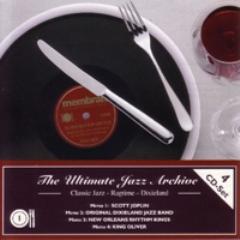The Ultimate Jazz Archive CD03 - New Orleans Rhythm Kings 1922-1935
The Ultimate Jazz Archive – CD03 - New Orleans Rhythm Kings 1922-1935

01.Eccentric 02.Farewell Blues 03.Bugle Call Blues 04.Panama 05.Tiger Rag 06.Sweet Lovin’ Man 07.That’s A-Plenty 08.Shim-Me-Sha-Wabble 09.Weary Blues 10.Maple Leaf Rag 11.Tin Roof Blues 12.Clarinet Marmalade 13.Mr. Jelly Lord 14.London Blues 15.She’s Crying for Me 16.Golden Leaf Strut 17.She’s Crying for Me 18.San Antonio Shout 19.Tin Roof Blues 20.Original Dixieland One-Step 21.Sensation 22.Dust off That Old Pianna (Oh Susannah)
The New Orleans Rhythm Kings (NORK) were the finest jazz group to be on record in 1922, and the white band has served as proof that, even that early, African-Americans were not the only ones who could play jazz with individuality and integrity. The key members of the group (leader/cornetist Paul Mares, trombonist George Brunis, and clarinetist Leon Roppolo) were childhood friends from New Orleans. In 1922, they started a 17-month residency at the Friar's Inn Nightclub in Chicago and in August they made their first recordings. Although Mares (unlike Nick LaRocca of the Original Dixieland Jazz Band) was modest about his own playing, saying that he was very influenced by King Oliver, he actually sounded quite a bit different and had a voice of his own. Roppolo was the first significant soloist on record, while Brunis would have a long career playing Dixieland. The changing rhythm sections sometimes included the first great jazz bassist Steve Brown (although largely inaudible on his early session), drummer Ben Pollack (a future bandleader), and, on a pair of memorable sessions in 1923, pianist Jelly Roll Morton. Among the future standards introduced by the NORK were "Farewell Blues," "Panama," "That's a Plenty," and "Tin Roof Blues"; the latter included a famous Brunis trombone solo. The band broke up in 1924 when Mares and Roppolo returned to New Orleans. With Santo Pecora on trombone they regrouped for a fine session on January 1925, but Roppolo was already suffering from mental problems; the group's final date two months later was without Roppolo, who would soon be institutionalized for the remainder of his life. Mares came back for one further session in 1935 but seemed happy in retirement, leaving the legacy of the NORK to history. ---Scott Yanow, Rovi
Zmieniony (Czwartek, 27 Grudzień 2012 18:05)








